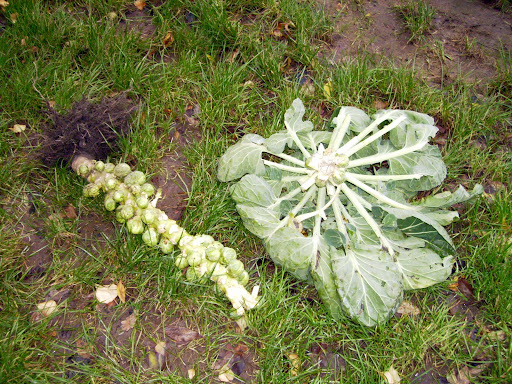 There's always vandalism on allotments. I suppose there always will be. I went there today and found my Brussels sprouts had been decapitated, and a red cabbage has been hacked apart with a spade. It could have have been worse, I suppose, but it's still annoying. I was saving those sprouts for Christmas dinner but I've had to pick them to use immediately.
There's always vandalism on allotments. I suppose there always will be. I went there today and found my Brussels sprouts had been decapitated, and a red cabbage has been hacked apart with a spade. It could have have been worse, I suppose, but it's still annoying. I was saving those sprouts for Christmas dinner but I've had to pick them to use immediately.We've been talking over on the selfsufficientish forums about "What is self-sufficiency". Here's my contribution to the discussion:
I saw a quote that said "You can't be self-sufficient in wellington boots". To be wholly self-sufficient and rely on no outside inputs whatever, you'd probably be living a stone-age existence. Which is one way to go if you really want to, but why would you want to?
Humankind is inherently social. We rely on other people. We form communities which help each other. That's a *good thing*. So complete self-sufficiency in that sense doesn't seem like a desirable goal to me.
But it is good to be self-sufficient in some things. Self-sufficientISH is a great way of describing it. I have a personal goal to be self sufficient in fruit and veg. It will take a few years but it's do-able. If we ever get more land I'd like to be self-sufficient in meat and dairy. That's a bigger goal. I'd love to be self-sufficient in energy and water. That would mean solar water heating, photovoltaic cells, a suitable site for a good-sized turbine, and a borehole I expect. It's definitely a long-term goal but it's in my mind.
Until then I try to get my fruit and veg and meat and dairy from local (organic, where possible) producers. We try to reduce our use of electricity and water, because that would be part of being self-sufficient in those things anyway, and we get our electricity from a "green" supplier.
It's not about the destination, it's more about the journey. It's about being aware of the impact of your lifestyle on the planet, and trying to make that impact as benign as possible. At the moment even the whole planet isn't self-sufficient, i.e. we can't sustain this way of living without bringing in resources from elsewhere, but there is no elsewhere. If I aim for self sufficiency, it's at the planet-wide level.
2 comments:
Nicely put, and very true. I read an article by a learned anthropologist a while back who pointed out that the Victorian image of the "noble savage" living in harmony with the land is total tosh. The picts and the celts cut down the forests, albeit slowly, as did the native Americans. It's only now that the various vectors for population control have been mitigated that we can see just how much damage we do as a species - and it's only now that we're putting our brains to work trying to find solutions. SSish is our contribution, and I think it's a right one.
I'm sorry to hear about your lottie, m'dear - being secluded here that's one problem I've not had to date (except When Travellers Ate My Gooseberries a couple of years ago). Sympathy.
All living organisms seek to maximise their own survival at the expense of competitors. Wild animals such as foxes and eagles would gladly eat every last wild rabbit and endangered vole given half a chance. Red deer can do terrible damage if unchecked. And even plants will obliterate all competitors if they can, look at Japanese knotweed for example. Humans are just better at it than most. Hopefully we're also smarter, smart enough to stop short of our own destruction.
Post a Comment